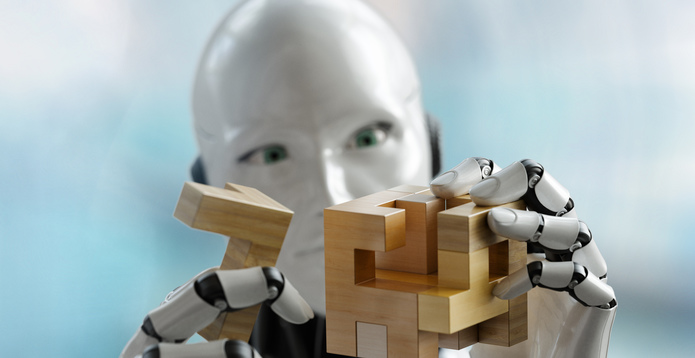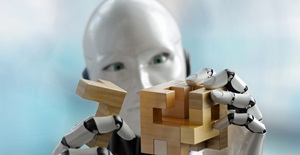Experts have called into question whether current artificial intelligence (AI) systems in operation are sophisticated enough to require intellectual property (IP) laws to be updated to protect any innovation that may be generated autonomously by a machine.
Professor Chris Dent, chair of industrial mathematics at the University of Edinburgh and fellow at the Alan Turing Institute, and patent attorney Alexander Korenberg of Kilburn & Strode, explored whether UK IP law is fit for the AI age at a recent event hosted by international law firm Pinsent Masons, the law firm behind Out-Law.
The issue has been brought into sharp focus in recent months following developments before the courts and in government policy making.
In September, the Court of Appeal in London ruled that AI systems cannot own or transfer patent rights under existing UK law. Pinsent Masons, the law firm behind Out-Law, understands, however, that the man at the centre of that case, Dr. Stephen Thaler, has filed an application to the UK Supreme Court seeking an appeal hearing.
Also in September the UK government published its national AI strategy, which alluded to potential changes to patent and copyright law. The Intellectual Property Office (IPO) has subsequently opened a consultation on various options for reform, which includes possibly writing a new form of IP right into UK law to provide protection to “AI-devised inventions”.
The notion of AI systems devising inventions, in the current state of the art at least, was queried by both Dent and Korenberg at the Pinsent Masons event.
Professor Chris Dent
University of Edinburgh
Whatever definition of AI, whatever example we think of, there will commonly be significant human input in its operation
According to Dent there is a disconnect between what people understand by the term ‘AI’ and what AI systems in operation currently can do. He cited the so-called Turing test, which measures the extent to which machines exhibit human intelligence. Where the behaviour of machines is deemed to be indistinguishable from that of humans it is known as artificial general intelligence (AGI), but this level of sophistication of machines has not yet been recognised.
“Whatever definition of AI, whatever example we think of, there will commonly be significant human input in its operation – at the very least in choosing and setting up the AI algorithm for the particular purpose at hand,” Dent said.
Korenberg said that the human factor in the operation of AI systems is relevant to the question of whether AI systems can ever be said to have devised an invention. He cited the use of AI in the drug discovery process as an example of his point. He said that while AI can shortcut the performance of functions humans would usually execute, such as researching literature, and produce results that can steer the direction of further research, ultimately the final decisions on where to invest funds in lab testing, clinical trials and taking a product through the regulatory approval process are made by people.
Alexander Korenberg
Kilburn & Strode
The output of an algorithm only really becomes information when a human appreciates its importance
“It is clear that what these algorithms do is uncover patterns in data,” Korenberg said. “That is very powerful and a very strong tool in analysing data and finding connections that previously weren’t there, but I wouldn’t say that it constitutes an invention.”
“The main ingredient that is missing is the difference between AI and AGI which is the element of judgement and appreciation of the important of the information – the output of an algorithm only really becomes information when a human appreciates its importance. Up until then it is only just ‘zeros’ and ‘ones’ without meaning. It is the appreciation of a human which is important which makes those numbers information and therefore makes it an invention,” he said.
Korenberg said that the notion that AI systems can devise an invention is not reflected in the existing patent framework.
“The whole patent system can be viewed as a bargain between the state and the inventor, where the state gives the inventor a time-limited monopoly in return for disclosing the invention in return for adding to human knowledge,” Korenberg said. “Arguably there is ingrained in the very essence of the patent system the concept that that the invention is a contribution to human knowledge and, if we accept that is the case, then by definition an invention is something that only humans are capable of in principle, regardless of how complicated a tool they use to do this.”

Dr Sue Chadwick
Strategic Planning Advisor
It is clear from a range of policy contexts that the government is concerned that the legal framework could stifle AI innovation
Dr Sue Chadwick of Pinsent Masons said the options for IP reform had to be viewed in the broader context of other UK AI-related policy initiatives.
“It is clear from a range of policy contexts that the government is concerned that the legal framework could stifle AI innovation,” Chadwick said. “The current consultation on reforming data regulation refers to the risk of law ‘unduly impeding data-driven innovation’ and the recently published AI strategy promotes removing regulatory burdens where they might create unnecessary barriers to innovation. Similar messages come through the recent consultation on AI and IP. The overall message is that while there need to be some safeguards on the use of AI, law should not get in the way of invention.”
Patent law expert Mark Marfé of Pinsent Masons, who chaired the recent event, raised concerns about the lack of evidence available to inform policy decisions on IP reform, however.
Marfé highlighted the fact that the impact assessment published by the IPO alongside its consultation paper acknowledges that there is a “high degree of uncertainty about the impact of potential policy changes” because of the lack of data and other evidence about AI generated inventions, as well as “uncertainty about the extent of the contribution of AI to inventions and creative works”.
Korenberg said that there also appears to be a lack of industry appetite for specific new protections to be introduced for AI-devised inventions, citing the fact that “invention machines” are not something that are visibly being pursued in AI and machine learning research. This view is also based on the industry responses to the UK IPO and US Patent and Trademark Office consultation on the topic. Both Korenberg and Marfé said that the uncertain environment for making policy decisions heightens the risks the UK faces if it elects to pursue IP reform targeting autonomous machine inventions in isolation from other countries.
“It could potentially be fatal to protection anywhere else in the world if we go it alone and have an idea and concept of inventors that is not recognised anywhere else in the world,” Korenberg said. “In a worst case scenario, we could scupper the standing of UK research and innovation across the world, if and when inventions devised by machines become a commercially relevant reality.”
“The patent system, in statute and in case law, has long been tuned to trade off the societal benefits of encouraging innovation and dissemination of information against the detriment to competition of giving out monopolies. It is a stable system that works quite well. If you lob in a new right that doesn’t follow the same standards who knows what that will do? It might be great, or it might have lots of unintended consequences, so this requires caution,” he said.



